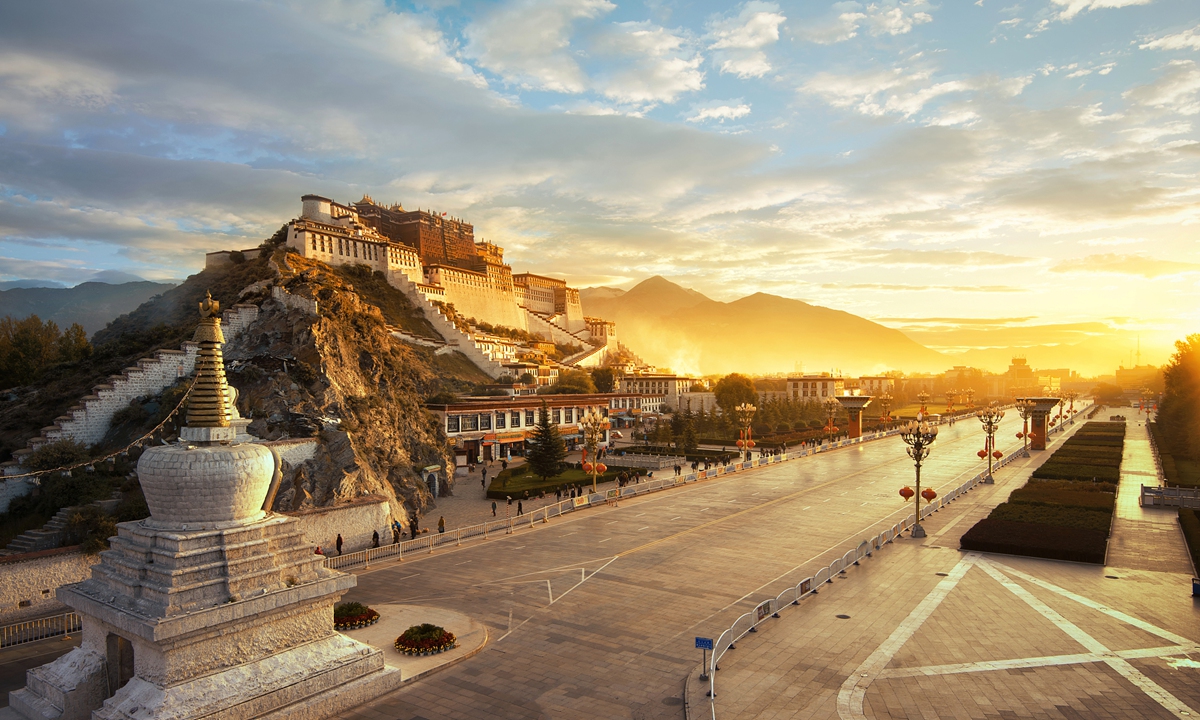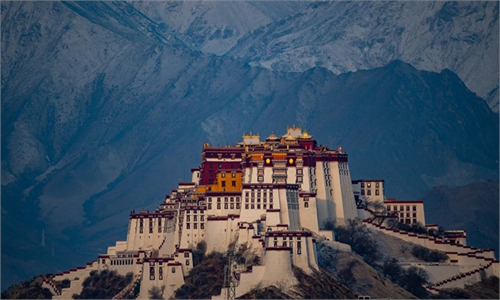
Photo: VCG
Recently, the Tibet Policy and Support Act was passed in US Congress and won bipartisan appraisal. Some senators even claimed that the act clearly shows US determination to safeguard the rights of the Tibetan people. This is nonsense.
The US has repeatedly played the "Tibet card" against China. Former US administrations admitted that Tibet is part of China. But during different periods, they had either publicly or clandestinely supported secessionist activities in Tibet.
Although US policies on Tibet vary, they have been based on US self-interests. After World War II, due to the need for anti-communist policies, the US lent more support to secessionist forces outside of China. During the Cold War, due to the need to woo China and counter the Soviet Union, the US stopped interfering publicly in Tibet-related affairs. After the Cold War, the US frequently used the Tibet card as an excuse to try to contain China.
The aim of US meddling in Tibet-related affairs in recent years has been sought to contain China's international rise. Besides, the trend to internationalize the Tibet question has changed according to China-US ties. During this process, both US Republicans and Democrats make own maneuvers, while Democrats are relatively more skillful at playing the Tibet card.
Promoting the internationalization of the Tibet question was believed to be one of the most effective leverages by US anti-China forces. Such moves peaked at the end of the 20th century and the beginning of the 21st century. During that period, Western anti-China forces followed the US' lead in terms of the Tibet question - they sympathized with the Dalai Lama and his followers.
After US President Donald Trump took office, he focused energy on engaging in a trade war with China. The Tibet card and human rights affairs related to the region were largely ignored by his administration.
Ever since George H. W. Bush in 1991 became the first US president to meet with the Dalai Lama, Trump has been the only US president who has not done so.
Those seeking Tibet secession must be expecting much more from the incoming Biden administration. It is anticipated that the new US government will replay the Tibet card to bridge the continuation of US policy toward Tibet for Trump's absence.
Biden and some members of his team have close relations with overseas Tibetans. They are inclined to playing the "human rights card."
Biden's team indicated many times during the campaign that they will step up support for Tibet. Biden promised that if elected, he will "put values back at the center of American foreign policy." He proposed to take measures including meeting with the Dalai Lama, appointing a new special coordinator, and linking human rights issues to economic and trade relations with China to pressure Beijing for direct talks with so-called "representatives of the Tibetan people."
Biden not only wants to play the Tibet card, but he even plans to expand its anti-China ranks with allies, to help the so-called Tibetan government-in-exile achieve greater freedom and autonomy. He also promised to host a summit of democracies in his first year in office, putting the focus of strengthening "democratic institutions" back on the global stage.
However, the political field of the Tibet question has changed greatly. First of all, with the development of greater information on the internet and the opening-up of China's Tibet Autonomous Region, the truth about Tibet has been more widely acknowledged.
The formation of multipolar international structures is leading Europe away from blindly following the US regarding the Tibet question. Moreover, the Dalai Lama is stepping down from power, with infighting among various sects within his group. The second, third and fourth generations of Tibetan people born abroad have become increasingly disinterested in politics and even religion. The splendid monastery in the Tibetan community in southern India is now empty.
Finally, and most importantly, with the advancement of the China-proposed Belt and Road Initiative, China's massive plan to develop its western regions, and the social and economic development in Tibet, more people are flowing back to the region.
With the development of China and the strengthening of its international influence, the international anti-China forces can hardly play the Tibet card at will any more.
The author is executive director of the Institute of South Asian Studies of Sichuan University. opinion@globaltimes.com.cn


